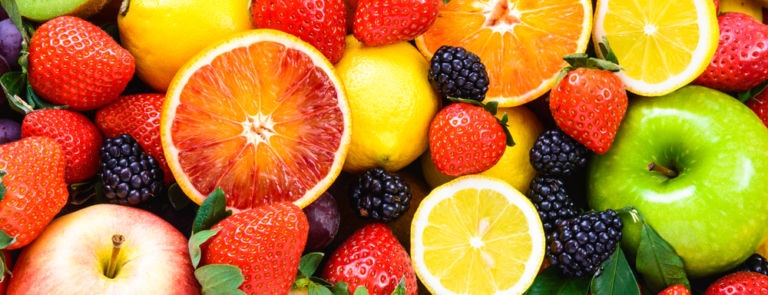We all know that having a healthy amount of fruit in your diet is generally a good thing.
It is recommended by the NHS that you should have at least five portions of healthy fruits and vegetables each day.
1
Most fruits are naturally low in fat, sodium and calories and do not contain cholesterol.
Fruits are also sources of lots of essential nutrients, including potassium, dietary fibre, vitamin C and folate.
2
Here we look at eight of the healthiest fruits.
1. Grapefruit
Grapefruit is one of the most nutritious fruits that you can eat.
It is also one of the fruits with a lower amount of calories, despite being a source of nutrients like fibre, vitamin C, vitamin A and potassium.
3
There are three different types of grapefruit – white, pink and red – and all three are similar in taste, texture and nutrients.
4
Grapefruits are 92% water, which means it has one of the highest water contents of any fruit.
All of our body’s processes require water so being hydrated makes your body more efficient and grapefruit can help you to get enough water.
5
2. Pineapple
These sweet, tropical fruits are rich in vitamins, enzymes and antioxidants and are low in calories - despite tasting so sweet.
Pineapples are one of the most healthy fruits around, as they contain manganese, which is important for antioxidant defences as well as thiamine.
6
Thiamine, or vitamin B1, contributes to normal energy-yielding metabolism and the normal functioning of the nervous system.
Your body does not make thiamine for itself, so pineapple is a great source of the vitamin.
7
3. Blueberries
Blueberries are believed to contain the highest amount of antioxidants of any of the most commonly consumed fruits.
8
They also contain fibre, vitamin C, vitamin K and manganese and the antioxidants contribute to the protection of cells against oxidative stress.
9
4. Apples
You know the old saying “an apple a day keeps the doctor away”? Well,
apples really are good for you!
They are one of the most popular fruits in the UK and one of the best fruits to eat daily.
We consume around 122,000 tonnes of apples each year in the UK – enough to fill 325 swimming pools!
10
Apples contain fibre, vitamins and minerals including vitamin C, potassium, vitamin K and B vitamins.
11
As well as this, they are also rich in a variety of antioxidants, which help to protect the cells from free radicals - reactive molecules that can build up as a result of natural processes and environmental pressures, and cause harm to the cells.
12
Apples are also a good source of pectin.
5. Pomegranates
Pomegranate seeds are packed with vitamins and minerals.
Pomegranates contain fibre, vitamin C, vitamin K, B vitamins, calcium, potassium and iron.
13
6. Strawberries
Not only are strawberries deliciously sweet, but they are also fat-free, cholesterol-free and low in calories.
They contain fibre, manganese, folate and potassium and they are also amongst the top 20 fruits in terms of antioxidant capacity.
14
7. Lemons
Although they taste quite sour and might not be your go-to for a yummy snack, lemons are a great source of vitamin C.
One lemon can provide around 31mg of the vitamin, which is over half of the recommended daily intake.
15
Vitamin C is a powerful antioxidant which helps to protect cells from the oxidative stress that free radicals can cause.
The body also needs vitamin C to help make collagen, which is a protein.
16
It is often used as an ingredient in anti-ageing skincare products.
17
8. Watermelon
As the name might suggest, watermelons are 92% water, so they can help you to feel hydrated as well as helping you to feel full, without eating a lot of calories.
18
Despite all that water, there is still space for plenty of nutrients!
Each bite of juicy watermelon contains vitamin A, vitamin B6, vitamin C, lycopene, antioxidants, and amino acids as well as some potassium.
19
Shop Food & Drink
Last updated: 9 February 2021
Sources
1
https://www.nhs.uk/live-well/eat-well/5-a-day-what-counts/
2
https://www.choosemyplate.gov/eathealthy/fruits/fruits-nutrients-health
3 https://www.healthline.com/nutrition/10-benefits-of-grapefruit#TOC_TITLE_HDR_2
4
https://www.berkeleywellness.com/healthy-eating/food/article/types-grapefruit
5
https://www.health.com/food/grapefruit-facts?slide=c50bbcf2-451f-441b-a634-cf4607d419d2#c50bbcf2-451f-441b-a634-cf4607d419d2
6
https://www.livescience.com/45487-pineapple-nutrition.html
7
https://www.nhs.uk/medicines/thiamine-vitamin-b1/
8
https://pubmed.ncbi.nlm.nih.gov/18759450/
9 https://www.healthline.com/nutrition/20-healthiest-fruits#TOC_TITLE_HDR_5
10
http://greatbritishapples.co.uk/faqs/
11 https://www.healthline.com/nutrition/20-healthiest-fruits#TOC_TITLE_HDR_6
12 https://www.medicalnewstoday.com/articles/267290
13
https://www.bbcgoodfood.com/howto/guide/health-benefits-pomegranate
14 https://www.webmd.com/diet/features/nutritional-benefits-of-the-strawberry
15 https://www.healthline.com/nutrition/6-lemon-health-benefits#TOC_TITLE_HDR_2
16
https://ods.od.nih.gov/factsheets/VitaminC-Consumer/
17
https://skinkraft.com/blogs/articles/fruits-to-eat-for-glowing-skin
18 https://www.healthline.com/nutrition/watermelon-health-benefits
19
https://www.livescience.com/46019-watermelon-nutrition.html



